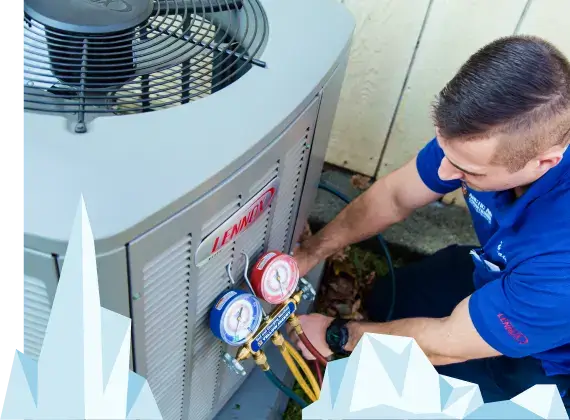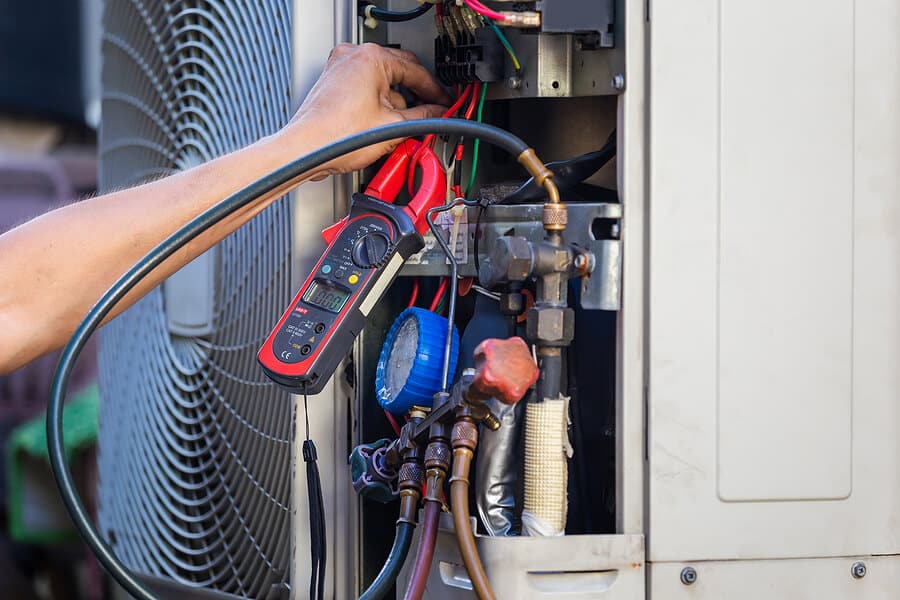Efficient Heating Repairs Done Right by DMAKS HVAC Experts.
Efficient Heating Repairs Done Right by DMAKS HVAC Experts.
Blog Article
Energy-Efficient A/c Solutions to Minimize Energy Costs
As energy prices remain to increase, the relevance of energy-efficient cooling and heating systems ends up being increasingly obvious. These systems not only assure significant financial savings on energy bills but additionally add to a more lasting future by decreasing energy consumption. With different alternatives readily available, including geothermal warmth pumps and ductless mini-splits, homeowner encounter a multitude of selections that can improve comfort and air top quality. Nonetheless, understanding the key features and upkeep needs is necessary to making the most of these benefits. What variables should be prioritized when picking the right system for your needs?
Advantages of Energy-Efficient Heating And Cooling Equipments
Energy-efficient A/c systems provide various benefits that expand beyond plain cost financial savings. By consuming less power, these systems add to lower greenhouse gas discharges, assisting to battle environment change and advertise sustainability.
Furthermore, energy-efficient HVAC systems commonly give boosted comfort degrees. Numerous of these systems include advanced modern technology that allows for better temperature control and improved air quality (DMAKS HVAC). This brings about a healthier indoor environment, which is particularly important for individuals with allergic reactions or breathing problems
In addition, spending in energy-efficient a/c systems can boost residential property worth. As more consumers focus on power performance, homes and structures furnished with these systems may attract higher bids in the real estate market.
Sorts Of Energy-Efficient A/c Options
Exactly how can home owners and organizations choose the most ideal energy-efficient heating and cooling choices for their needs? The marketplace uses a variety of energy-efficient heating and cooling systems, each developed to enhance convenience while lessening energy intake.
One alternative is the variable refrigerant circulation (VRF) system, which successfully controls the temperature in numerous zones within a structure. This system adapts its cooling agent flow to match the preferred temperature level, bring about substantial energy cost savings.
An additional preferred selection is geothermal warmth pumps, which make use of the earth's steady temperature level to heat and trendy rooms. By moving warmth to and from the ground, these systems demonstrate remarkable effectiveness, especially in modest climates.
In addition, ductless mini-split systems offer an energy-efficient choice for homes lacking ductwork. These systems permit zone-specific heating & cooling, reducing energy waste in empty areas.
Lastly, high-efficiency heating systems and air conditioning unit, with sophisticated SEER and AFUE ratings, supply dependable environment control while consuming less energy than typical designs. By evaluating these choices, home owners and businesses can choose a HVAC system customized to their details demands and energy effectiveness objectives.
Secret Attributes to Consider

Following, check out the sort of compressor made use of in the system. DMAKS HVAC. Variable-speed compressors can adjust their result to match the home heating or cooling need, bring about boosted comfort and energy cost savings contrasted to single-speed models. Furthermore, search for systems equipped with clever thermostats that provide programmable setups and remote accessibility, enabling better control over power usage
An additional vital feature is the system's air filtering capacity. High-efficiency filters can boost interior air high quality and lower energy consumption by ensuring the system runs effectively. Additionally, think about the kind of refrigerant made use of; modern-day systems usually use environment-friendly cooling agents that have a reduced environmental effect.
Lastly, ensure that the system works with zoning modern technology, which permits personalized temperature control in various locations of your home, improving convenience while lessening energy usage.
Tips for Picking the Right System


Next, consider power efficiency ratings, particularly the Seasonal Energy Efficiency Proportion (SEER) for cooling systems and the Yearly Fuel Application Effectiveness (AFUE) for furnace. Higher rankings suggest greater performance, which can lead to substantial cost savings on utility costs gradually.
Additionally, evaluate the kind of cooling and heating system that finest suits your way of living and budget. Alternatives include central air, ductless mini-splits, and heatpump, each with its own collection of benefits and disadvantages.
Do not overlook the relevance of correct setup and sizing; an incorrectly sized system can lead to inefficiencies and increased wear. Consult with a specialist HVAC specialist to acquire expert referrals tailored to your home's one-of-a-kind requirements. This extensive strategy will certainly ensure that you select an energy-efficient heating and cooling system that satisfies your requirements and spending plan efficiently.
Upkeep for Optimum Efficiency
Once the ideal HVAC system remains in location, recurring upkeep becomes essential to making sure ideal performance and long life. A well-kept system operates a lot more properly, leading to reduced power intake and lowered energy costs. Normal inspections and tune-ups should be set up a minimum of twice a year-- as soon as before the cooling period and as soon as before the heating season.

House owners should additionally be vigilant regarding checking their cooling and heating system's performance. Uncommon noises, changing temperatures, or enhanced power bills can suggest underlying issues that need prompt attention. By attending to these concerns quickly, homeowners can stop pricey repair work and prolong the life-span of their systems.
Buying an upkeep plan with a qualified service technician not just enhances efficiency but additionally provides satisfaction, understanding that the system is running at its ideal. DMAKS HVAC. Routine upkeep is therefore vital for maintaining power performance and decreasing total functional prices
Verdict
Finally, energy-efficient heating and cooling systems provide a viable solution for reducing utility bills while enhancing click for more comfort and air high quality. By integrating sophisticated innovations and choices such as geothermal heatpump and ductless mini-splits, homeowner can attain substantial energy financial savings and add to environmental sustainability. Careful factor to consider of system attributes and continuous maintenance additionally makes certain optimum efficiency, making energy-efficient systems a prudent investment for both financial and this post environmental advantages.
Report this page